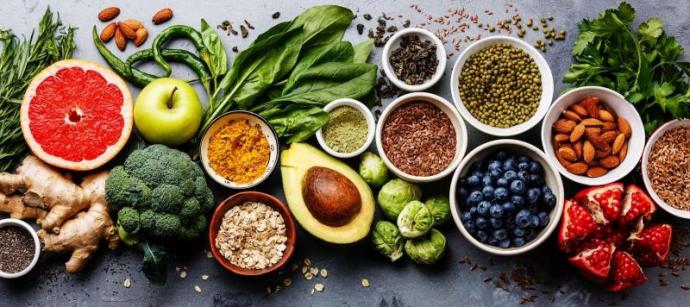Plant-forward Eating with Your Family
By Kristen Sportiello; Harrison Hall; and Sandra Jee, MD, MPH
Practical advice from Finger Lakes Children's Environmental Health Center.
Did you know that eating less meat is good for your family and the world around you? According to the American Heart Association, eating less meat decreases the risk of heart disease, stroke, obesity, high blood pressure, high cholesterol, type 2 diabetes, and many cancers. Meat is often loaded with cholesterol and saturated fat, which can contribute to poor heart health. Processed meats are often high in sodium, which can lead to high blood pressure.
Moreover, reducing the demand for meat consumption can help our environment: Beef production, especially, creates greenhouse gases that trap heat in the earth's atmosphere. Enteric fermentation occurs when bacteria in cows’ rumens break down what cows eat to produce methane, which is released when cows burp. In addition, cow manure releases methane and nitrous oxide, and the chemical fertilizers used to grow the crops to feed cows release nitrous oxide as well. So this is another reason your family might want to consider joining those who have chosen plant-based diets.
Fortunately, it is possible to make a difference without cutting all the meat out of your diet. There are several types of diets that contain little or no meat, and choosing any of them would help make the world a healthier, safer place for your child. You may not be ready to completely revamp your family's diet, but small, incremental changes can add up. You might also find that, as your children grow, those little ones that you had to convince to eat vegetables are now lobbying for more plant-based options as they become teens and tweens who want to help the planet.
 Eating a Healthy Plant-forward Diet
Eating a Healthy Plant-forward Diet
It's still possible to have a very unhealthy diet without eating meat: A diet consisting only of Oreos, for example, would be vegan, but this diet would not be good for anyone! Some plant-based foods are much more nutritious than others; studies have indicated that eating foods like fruits, vegetables, whole grains, and nuts leads to better health than eating foods like fruit juices, refined grains, sweets, and potatoes.
Many think that it is impossible to eat enough protein without eating meat, but this is not true. There are many plant-based sources of protein like chickpeas, lentils, mushrooms, and most beans and legumes. Many vegetables contain a good amount of protein as well, and peas, broccoli, and spinach are especially high in protein. Look online to see how much protein you can get from your family’s favorite veggies.
Importantly, vegan diets do not contain vitamin B12, which is essential for health. Because of this, vegans need to take B12 supplements or eat foods that have been fortified with B12. Nutritional yeast (yeast produced to be eaten, not used to make bread or beer) and cereals often have added B12. See the nutrition facts on the food you buy for more information.
Children and Vegetarian Diets
Children can eat a vegetarian diet and be healthy, but it’s important to make sure your child gets all the nutrients they need. Children need more of certain nutrients because they are growing. Iron is especially important for children going through growth spurts or for children who have had their first period. Iron is found in meat, but foods like spinach, whole grains, and beans have smaller amounts of iron. Foods with lots of vitamin C like fruits and tomatoes can help the body absorb iron.
Calcium and Vitamin D are also very important for growing kids because they help keep growing kids’ bones strong. Milk and dairy products contain lots of calcium, and kids who drink milk every day and eat dairy products probably get enough calcium. If your child does not consume milk or dairy products, they need to get calcium from other sources, such as supplements or foods with added calcium. Cereal, orange juice, and breakfast bars often have calcium added to them. See the nutrition facts on the products you buy for more information. Your child can get vitamin D from eggs, fish, or the sun. Wearing sunscreen in the sun makes your body produce less vitamin D, but it also protects you from skin cancer.
Zinc is important for growing and protecting against infections. Zinc is found in meat, milk, and dairy products, but it is also found in grains, nuts, beans, and soy products.
Ask your child’s nurse or doctor if your child is getting enough nutrients.
Finger Lakes Children’s Environmental Health Center (FLCEHC)
The Finger Lakes Children’s Environmental Health Center is based at the University of Rochester Medical Center and is supported by New York State Department of Health. We are part of a network of seven children’s environmental health centers across New York State.
We are available to answer any questions and to do free consultations regarding environmental health concerns that you or your family may have. We are also a resource for health care providers.
Environmental health hazards include physical hazards and toxic substances that can enter our bodies through the air or through food or water. They can have many negative effects on physical, mental, and emotional health.
We can answer questions about specific environmental or toxic exposures, including, but not limited to:
- asthma triggers
- chemicals and poisons
- indoor air quality issues
- heavy metal exposure
- mold and pesticides
- climate change impacts on health
- and questions about COVID-19, including for pregnant moms and moms who are breastfeeding.
We offer free phone consultations to health care providers and families to answer their questions about environmental health concerns (such as those noted above). We also have free resources on COVID-19 and on maintaining a healthy home.
To reach us, call our phone line at (585) 275-3638 or toll-free (844) 352-3420 or (844) FLCEHC-0.
Kristen Sportiello is a second year medical student at the University of Rochester.
Harrison Hall is a senior in high school at the Peddie School.
Sandra Jee, MD, MPH, is Co-Director of the Finger Lakes Children’s Environmental Health Center and a board certified pediatrician who sees patients at the Golisano Children’s Hospital Pediatric Practice of University of Rochester.




